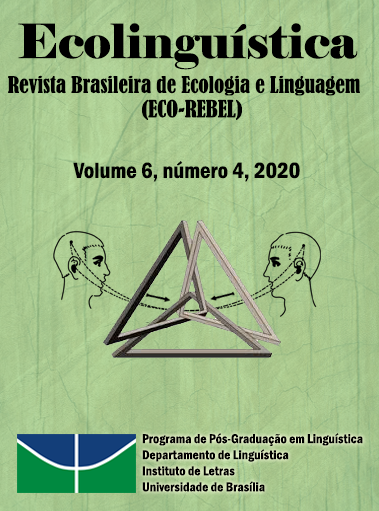Swachh Bharat Abhiyan and the canadian environment week: case studies in sustainable development campaigns
Palavras-chave:
Swachh Bharat Abhiyan; Semana Canadense do Meio Ambiente; campanha de desenvolvimento sustentável; tratamento de lixo; princípio 3R.Resumo
Diante da crescente constatação da importância da comunicação para o desenvolvimento sustentável, o envolvimento da nova mídia em campanhas ambientais tem emergido como um instrumento indispensável para mudar o comportamenrto das pessoas em grande escala. Este ensaio estuda duas campanhas estratégicas de desenvolvimento sustentável: Swachh Bharat Abhiyan da Índia e a Semana Canadense do Meio Ambiente. Em ambos programas a mídia tem sido bastante usada com a finalidade de suscitar a consciência coletiva para motivar as pessoas a serem partícipes bem como agentes na mudança para um desenvolvimento sustentável em prol de uma sustentabilidade pessoal, nacional e global. No artigo, a agenda e a ação de ambas campanhas bem como suas narrativas básicas são analisadas a fim de pontuar as tendências emergentes na comunicação sustentável.
Referências
Business Insider, (2019, June 3). Minister McKenna launches Canadian Environment Week.
CHEN, W.Y.; HUA, J. (2015). Citizens’ distrust of government and their protest responses in a contingent valuation study of urban heritage trees in Guangzhou, China. Journal of Environmental Management 155, 2015, p. 40”“48. DASH, R. K.; DASH, A. K. (2019). The new media and the promotion of ecological entrepreneurship. Media watch v.10, n. 2, p. 419 ”“ 431.
ELKINGTON, J. (2004). Enter the triple bottom line. In: HENRIQUES, A.; J. RICHARDSON, J. (eds.). The triple bottom line: Does it all add up? (p. 1-16). Earthscan. Environment and Climate Change Canada. (2011, Jun 9). Environment Canada - 40 Years of Environmental Leadership [Video].
https://www.youtube.com/watch?v=2BBVcWffIpA
Environment and Climate Change Canada (n.d.). Canadian Environment Week.
https://www.canada.ca/en/environment-climate-change/services/canadian-environment-week.html Environment Canada (2018). Environment and Climate Change Canada, Values and Ethics Code. Available at:
https://www.canada.ca/en/environment-climate-change/corporate/mandate/values-ethics.html GOUGH, I. Welfare states and environmental states: a comparative analysis. Environmental Politics, 25 (1), 2016, 24-47. doi: 10.1080/09644016.2015.1074382.
Government of India (n.d.). Swachh Sankalp Se Swachh Siddhi Essay Competition.
https://www.mygov.in/task/swachh-sankalp-se-swachh-siddhi-essay-competition/
GRUNIG, J. E. Review of research on environmental public relations. Public Relations Review, v. 3, n. 3, 1977, p. 36-58. doi:10.1016/S0363-8111(77)80212-9
India Today, (2019, March 29). Government claims clean Ganga work is on fast pace after India Today TV's report.
KIL, N.; HOLLAND, S. M.; STEIN, T.V. (2014). Structural relationships between environmental attitudes, recreation motivations, and environmentally responsible behaviors. Journal of Outdoor Recreation Tour, v. 7”“8, 2014, p. 16”“25.
KRESS, G.; VAN LEEUWEN, T. Reading Images: The Grammar of Visual Design, 2nd edn. London: Routledge, 2006.
Ministry of Drinking Water & Sanitation Independent Verification of Swachh Bharat Grameen confirms over 96% usage of toilets, (2019, March 5).
https://pib.gov.in/PressReleaseIframePage.aspx?PRID=1567486 Ministry of Human Resource Development, Government of India (n.d.). Swachh Bharat “Ek Kadam Swachhata Ki Aur”.
https://mhrd.gov.in/swachh-bharat-ek-kadam-swachhata-ki-aur NARENDRA MODI. PM Modi's Speech at 3rd Anniversary of Swachh Bharat Mission [Video]. (2017, October 2). Available at
https://www.youtube.com/watch?v=oHx7_XjshuQ
New Brunswick Lung Association (n.d.). 2018 Annual Report.
https://nb.lung.ca/sites/default/files/annual%20report%202018.pdf Press information Bureau India. (2018, May 27). Twin Pit Technology Campaign [Video]. [Video].
https://www.youtube.com/watch?v=dFpF2RK-gO4
Press Information Bureau of India. (2020, March 12). Increase in Funds for Namami Gange Programme.
https://pib.gov.in/PressReleseDetailm.aspx?PRID=1606102
Rail Safety Research and Development Forum (n.d.). My Clean India.
http://www.railsafety.net.in/clean-india.html SÖRQVIST, P.; LANGEBORG, L. Why people harm the environment although they try to treat it well: An evolutionary-cognitive perspective on climate compensation. Frontiers in Psychology, 10, 348(2019, March 4).doi.org/10.3389/fpsyg.2019.00348
STERN, N. The economics of climate change: the stern review. Cambridge: Cambridge University Press, 2017.
Swachh Bharat Mission ”“ Urban. (2019, January 4) Swachhata ki bani aadat, Swachh ho raha Bharat. https://www.facebook.com/SwachhBharatUrban/ [Facebook update] Retrieved from
Swachh Bharat Mission - Gramin Reports (2019).
https://sbm.gov.in/sbmReport/Report/Physical/SBM_TargetVsAchievementWithout1314.aspx
The Statesman (2017, October 28, Delhi Edition). Media worked in ‘mission mode’ to promote Swachh Bharat: Modi.
The Times of India (2019, January 3, Delhi Edition). SWACHHATA KI BANI AADAT. UN Environment Annual Report (2018). Putting the Environment at the Heart of People’s Lives.
https://www.unenvironment.org/annualreport/2018/index.php. UNICEF India (2014). Clean India - Clean schools.
http://unicef.in/Whatwedo/39/Clean-India-Clean-Schools
VINCENZI, S. L.; POSSAN, E.; DE ANDRADE, D. F.; PITUCO, M.M.; DE OLIVER SANTOS, T.; JASSE, E.P. Assessment of environmental sustainability perception through item response theory: A case study in Brazil. Journal of Cleaner Production, 170, 2018, p. 1369”“1386.
Downloads
Publicado
Edição
Seção
Licença
Copyright (c) 2020 Ecolinguística: Revista brasileira de ecologia e linguagem (ECO-REBEL)

Este trabalho está licenciado sob uma licença Creative Commons Attribution-NonCommercial-NoDerivatives 4.0 International License.
Autores que publicam nesta revista concordam com os seguintes termos:
Autores mantêm os direitos autorais e concedem à revista o direito de primeira publicação, sendo o trabalho simultaneamente licenciado sob a Creative Commons Attribution License o que permite o compartilhamento do trabalho com reconhecimento da autoria do trabalho e publicação inicial nesta revista.
Autores têm autorização para assumir contratos adicionais separadamente, para distribuição não exclusiva da versão do trabalho publicada nesta revista (ex.: publicar em repositório institucional ou como capítulo de livro), com reconhecimento de autoria e publicação inicial nesta revista.
Autores têm permissão e são estimulados a publicar e distribuir seu trabalho online (ex.: em repositórios institucionais ou na sua página pessoal) a qualquer ponto antes ou durante o processo editorial, já que isso pode gerar alterações produtivas, bem como aumentar o impacto e a citação do trabalho publicado (Veja O Efeito do Acesso Livre).



3.png)



